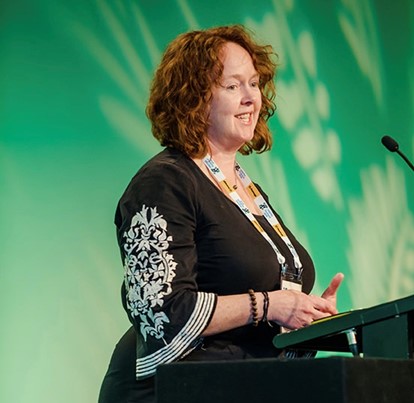
Stepping foot on campus for the first time, after studying remotely for her degree, is a moment Suni Edson (PhD(Biol) ’19) won’t soon forget. With the COVID-19 pandemic unknowingly just around the corner, she was luckily able to attend her graduation in person coming all the way from her hometown of Wyoming, Delaware, USA.
“I have a photo in my home taken of campus from the hillside above the University and it makes me smile every day,” she says.
Suni chose to study at Flinders University thanks to a friend’s recommendation and her own respect for Professor Adrian Linacre’s work in the field of forensic science.
Her role at the time within the Past Accounting Section of the Armed Forces DNA Identification Laboratory (AFDIL) focused on the use of DNA to identify the remains of missing service members from past military conflicts dating back to World War II, so being able to tailor her studies to advance the AFDIL’s abilities was an ideal situation.
“My project allowed me to think laterally about why DNA testing might not work on the skeletal materials we have,” she explained.
“When something does not work, our initial course of action would simply be to repeat the testing. Now, we are working towards knowing exactly why a particular test failed and working to overcome those difficulties.”
Suni has continued her work with AFDIL, rising through the ranks to become Assistant Technical Leader, a position she has held for nearly 13 years.
Given her passion for science, the College of Science and Engineering alumni network were thrilled when Suni joined the Science, Technology, Engineering and Mathematics (STEM) Alumni Steering Group.
As part of the group, she’ll assist in the development and implementation of initiatives and programs that are relevant and valuable to our alumni and current students across a diverse range of fields in STEM.
Although more focused on the less glamorous managerial side of things these days, Suni still gets a buzz from the good work AFDIL is doing in reuniting families with their lost ones.
“Some days I get the benefit of being able to speak with family members, those of stakeholder agencies, or scientists from other countries about how we do our skeletal remains testing,” she says.
“AFDIL is at the forefront of many DNA testing techniques, and I enjoy being able to speak to others about what we have been able to accomplish.
“I consider every day we bring home another missing service member to their family to be an outstanding accomplishment. I am proud to be a part of this mission.”

